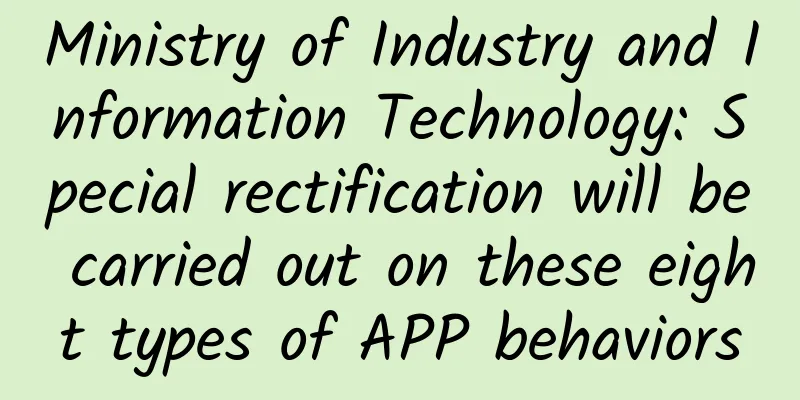Ministry of Industry and Information Technology: Special rectification will be carried out on these eight types of APP behaviors

|
On November 25, the Ministry of Industry and Information Technology issued the "Notice on Carrying out Special Remediation Work on APPs that Infringe User Rights and Interests", launching a new round of supervision, inspection and standardized remediation of APPs' illegal collection of personal information, excessive rights requests, and frequent harassment. The notice pointed out that eight types of APP violations were included in this round of rectification, including: 1. "Collecting personal information without permission." This means that the APP collects user personal information without clearly informing the purpose, method and scope of collecting and using personal information and obtaining the user's consent. 2. "Collection of personal information beyond the scope". This means that the APP collects personal information that is not necessary for the service or has no reasonable application scenario, and collects personal information beyond the scope or frequency, such as address book, location, ID card, face, etc. 3. " Sharing with third parties without permission ." This means that the APP shares and uses user personal information with other applications without the user's consent, such as device identification information, product browsing history, search and usage habits, and lists of frequently used software applications. 4. " Forcing users to use the targeted push function ." This means that the APP uses the collected personal information such as user searches, browsing history, and usage habits for targeted push or precision marketing without informing the user or not clearly indicating it, and does not provide an option to turn off the function. 5. “No permission, no use.” This means that when the APP is installed and running, it asks the user for permissions that are irrelevant to the current service scenario. If the user refuses to authorize, the application will exit or close. 6. “ Frequent application for permissions ”: After the user explicitly refuses the permission application, the APP frequently applies for permissions that are irrelevant to the current service scenario, such as address book, location, SMS, recording, camera, etc., to harass the user. 7. " Excessive request for permissions ". This means that the APP applies for permissions to open the address book, location, SMS, recording, camera, etc. in advance when the user is not using the relevant functions or services, or applies for permissions to open the address book, location, SMS, recording, camera, etc. beyond its business functions or services. 8. “Difficulty in account cancellation”: The APP does not provide account cancellation service to users, or sets unreasonable obstacles for the cancellation service. |
Recommend
Big reveal: How aerospace technology changes our lives - Clothing
In the vastness of the universe, China's spac...
Winner! The women's volleyball team reversed and won the championship! Total of brand leverage posters (full version)
After 12 years, the Chinese women's volleybal...
Tesla's annual marketing expenses are only 180 million yuan, Geely's are 20 times that, and Volkswagen Group's are as high as 162 billion yuan.
Tesla disbanded its core public relations team. C...
Find inner peace with 1 minute of quiet piano music
Find inner peace in 1 minute with the sound of th...
WeChat officially launches Windows client
On the evening of January 27, WeChat officially l...
Is boiled water more than 16 hours old like a "chronic poison"? If you make these 5 water drinking mistakes, you may get sick!
As the saying goes, "Food is the most import...
Guide for the National Day holiday, Youji uses VR to give you a different kind of fun
2016 can be called the first year of VR. With onl...
Android obfuscation from entry to mastery
Introduction As an Android developer, if you do n...
How did Chinese scientists bring down the price of abalone? | BoLan Daily
How did Chinese scientists bring down the price o...
Is this the real "water ball" in the universe? With more than 10% of water, it can "kill" the earth in seconds!
Author: Huang Xianghong Duan Yuechu In the depths...
Brand Marketing Promotion: How to design a poster?
Nowadays, countdowns are widely used, including b...
They are all “lithium batteries”, so why can power banks be brought on planes, but electric bicycles always have accidents?
In recent years, fires caused by electric bicycle...
Some technologies of Visual Studio Code come from Github
Microsoft released its first cross-platform code ...
AutoForecast Solutions: Due to chip shortages, North American factories have been forced to cut nearly 1.06 million vehicles from production plans in 2022
It is learned that the ongoing global semiconduct...
Bidding price adjustment ideas, Baidu bidding price adjustment strategies and analysis!
When we are doing bidding promotion, we must make...









